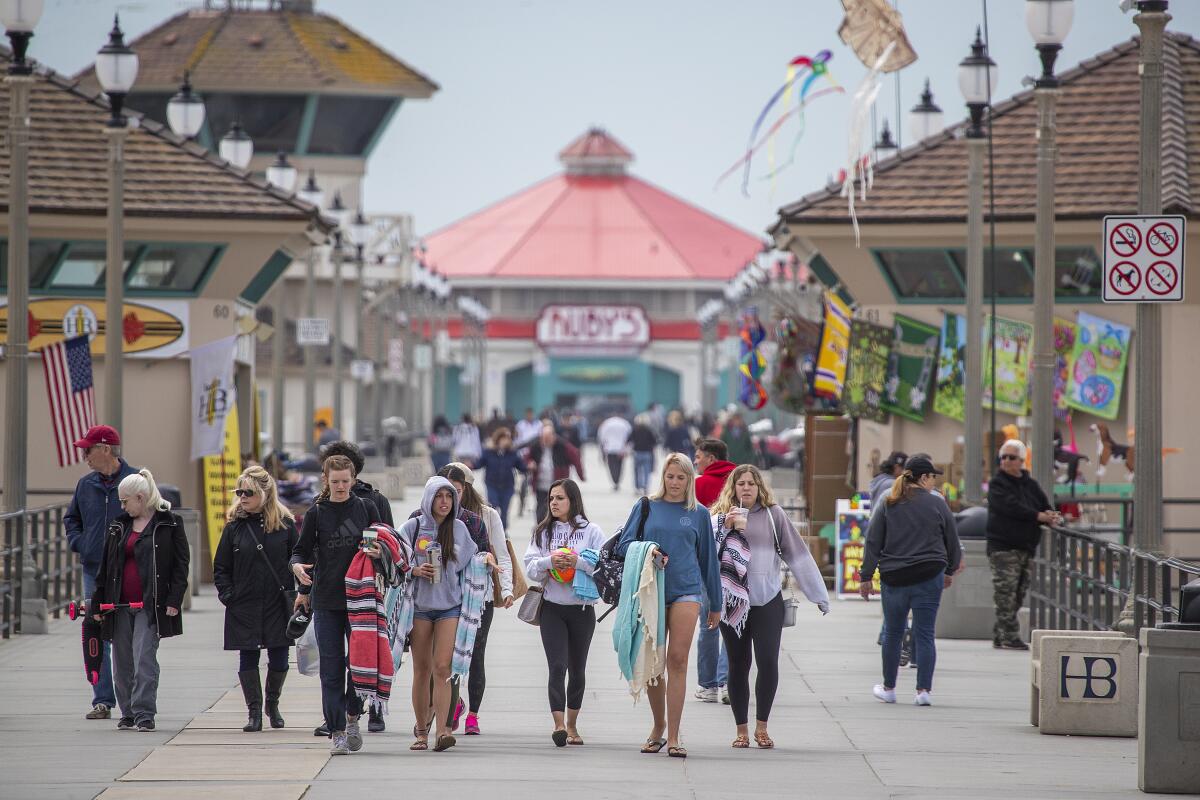If the government says to close up shop and stay home to fight the coronavirus, do it. That means you too, Elon Musk

- Share via
To halt the spread of the novel coronavirus, federal, state and local governments have called on us to separate ourselves as much as possible from others. The result in much of the United States has been the complete disruption of daily life, with schools suspending classes, businesses scaling back operations, workers staying home and bars, restaurants, malls, arenas and movie theaters going dark.
Not surprisingly, though, some people are failing to comply with the new rules and admonitions. Photos of empty beaches and downtown districts abound, but so do shots of crowds of spring break partiers in Florida and packed concerts in Nashville.
And then there’s Elon Musk, founder and chief executive of Tesla. First, Musk scoffed at the efforts taken globally to slow the pandemic. “The coronavirus panic is dumb,” he tweeted on March 6. Ten days later, he tweeted about possible treatments, then added, “That said, danger of panic still far exceeds danger of corona [in my opinion]. If we over-allocate medical resources to corona, it will come at expense of treating other illnesses.”
That same day, Alameda County ordered all residents to remain at home and all but “essential” businesses — a list that includes grocery stores, plumbing and electrician services and banks — to pare their operations to a minimum for three weeks. Tesla responded by declaring its manufacturing plant in Fremont “essential” and instructing workers to come into the plant if they felt healthy; if they were sick, well, they could use whatever paid time off they’d accumulated.
The county sheriff begged to differ, declaring that Tesla, which makes luxury electric vehicles, was not, in fact, an essential business. But neither the sheriff nor any other enforcement agency forced the company to comply; instead, it continued to crank out cars. And although the sheriff’s office said the company had cut its workforce at the plant from 10,000 to 2,500, it wasn’t clear that anything had actually changed — only about a quarter of its workforce was in the plant on any shift even in normal times.
Actually, one thing had changed: The company told the Mercury News that it was taking workers’ temperature before they entered the plant, “handing out masks to be worn throughout the day,” cleaning work areas more frequently and “rearranging operations to promote social distancing as much as possible.” In other words, Tesla planned to follow its own rules, not the county’s.
Finally, after meeting with the chief of the Fremont police and other city officials on Thursday, Tesla announced that it would temporarily suspend its new car production ... starting Monday. Its battery plant in Nevada, however, would continue functioning as usual.
That attitude is frankly both unacceptable and dangerous; a privileged employer thumbed its nose at legal mandates designed to protect public health, and apparently did so with impunity. It is outrageous that the company, like the flocks of oblivious beachgoers and pub-crawlers in Florida, would put its own interests ahead of everyone else’s. And “everyone else” in this case includes Tesla’s own employees, many of whom took to social media this week to say how disturbed they were to be forced to do something they believed to be unsafe for themselves and their families.
The guidance from health officials couldn’t be more clear, especially now that the Trump administration and its acolytes at Fox News Channel have stopped downplaying the disease threat. The only question is how stringent the restrictions need to be, which will depend on how quickly the coronavirus is spreading in any given area and how vulnerable the local population may be to COVID-19. Remember, the point is to “flatten the curve,” keeping the rate of infection low enough to ensure that local healthcare systems will be able to provide everyone who becomes critically ill with the care they need.
How stringent the restrictions will be also depends on the public’s compliance. The simple fact is that if Americans cannot take the restrictions and guidelines adopted by government to heart, then further laws and mandates will inevitably follow, undoubtedly with stepped-up enforcement.
Granted, these social-distancing efforts will take a toll on our incomes and on the economy as a whole, and it’s vital that Congress step into the breach to keep individuals and businesses afloat. But in the meantime, people must listen to what the health experts are saying and follow their advice. The best way to avoid tougher and longer-lasting restrictions on daily life is to behave responsibly and help your community interrupt the chain of coronavirus transmission.
More to Read
A cure for the common opinion
Get thought-provoking perspectives with our weekly newsletter.
You may occasionally receive promotional content from the Los Angeles Times.









